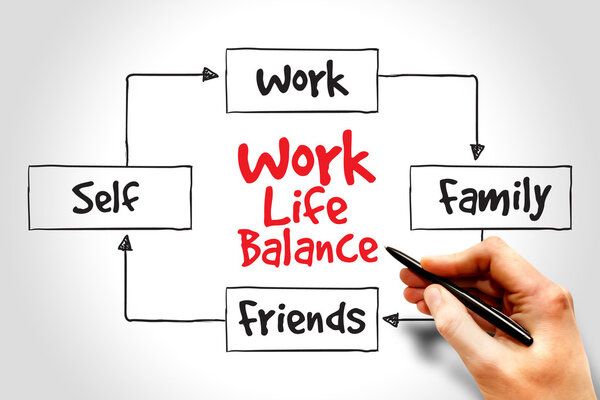Add your promotional text...
Effective Strategies for Balancing Work, Parenting, and Fitness for Men and Women Regardless of Relationship Status


Effective Strategies for Balancing Work, Parenting, and Fitness for Men and Women Regardless of Relationship Status
In the bustling city of Milltown, there lived a remarkable woman named Sarah. Sarah was in her thirties, navigating the intricate balance between work, parenting, and finding time for herself at the gym. Like many women in her age group, Sarah faced the daily challenges of multiple responsibilities while trying to maintain a sense of fulfillment and personal well-being. Sarah was a dedicated and passionate marketing executive, constantly striving to excel in her career.
But as the demands of her job grew, she couldn't help but feel a tinge of guilt whenever she had to leave the office to pick up her two young children from school. As Sarah's story unfolded, she faced numerous obstacles that tested her ability to maintain balance in her life. One of the biggest challenges she encountered was the constant guilt and pressure she felt as a working mother. Balancing the demands of her career with the needs of her children often left her feeling torn and overwhelmed. Sarah struggled with the fear of missing out on important moments in her children's lives while she was at work. She longed to be there for every school event, parent-teacher conference, and soccer game. However, she also recognized the importance of her career and the financial stability it provided for her family. To alleviate some of the guilt, Sarah became a master of time management. She meticulously planned her schedule, carving out dedicated moments for her children, such as reading bedtime stories or helping with homework. She also made it a priority to attend important events and milestones in her children's lives, even if it meant rearranging her work schedule.
With all that on her shoulders though successful, Sarah struggled to balance her work schedule with the demands of her children's schedules, such as school drop-offs and pick-ups, extracurricular activities, and homework assistance. She often found herself responding to work emails or taking calls during her personal time, which blurred the boundaries between her professional and personal life. Finding time for exercise, relaxation, and personal hobbies became a challenge, which affected her overall well-being. The constant balancing act of being a working mother led to emotional ups and downs. Sarah experienced moments of joy and pride in her accomplishments, but also moments of frustration, sadness, and even resentment.
Juggling work and family responsibilities was a physically and mentally exhausting cycle, lack of sleep, non-stop multitasking, and feeling constantly "on" without enough time for self-care or rest.
Having limited time she neglected her own needs and well-being in order to prioritize the needs of her family and work.
Can you relate to Sarah?
Understand the thoughts of a working or single Mom.
How can I find time for myself without feeling guilty?
How can I excel in my career while still being a present and involved parent?
Am I doing enough for my children?
How can I find time for my relationship without feeling guilty?
How do other working women manage to stay organized and stay on top of everything?
Is it possible to find a balance between work, parenting, and my personal fitness goals?
Effective Strategies for Balancing Work, Parenting, and Fitness for Men and Women
Regardless of Relationship Status
Effective Time Management:
1. Identify and prioritize tasks based on their urgency and importance, this first step is crucial. Determine what is most important to you in each area of your life - career, parenthood, and fitness. Set short term goals, and have specific steps outlined you will follow to reach them. Technology can be a valuable tool in balancing multiple responsibilities. Utilize productivity apps, calendar reminders, and automation tools to streamline tasks and save time. For example, scheduling gym sessions or work tasks in a digital calendar can help ensure they are not overlooked. Automating certain household chores or utilizing online shopping services can free up time as well.
2. Delegate and ask for help, recognize that you can't do everything on your own. Delegate tasks at work and at home, don't hesitate to ask for help from your partner, family members, or close friends. Your close friends are like the roots of a tree. Just as the roots provide stability and nourishment to the tree, your friends provide support and care in your life. The same way a tree relies on its roots to keep it strong, rely on your friends, by your actions show them you value their support. By giving them the opportunity to show you why they value you, you strengthen your bond and create a mutually beneficial relationship. Sharing responsibilities can lighten your load and allow you to focus on what matters most. Freeing up valuable time for focusing on
self care, your family, and gym activities... in that order. YOU MATTER, focus on YOU first. Then you can give 100% of you, the refreshed you, the very best of you, to your family (who deserve it) and to the gym.
3. Be flexible and adaptable in your approach to balancing work, parenthood, and fitness. Understand that there will be times when one area requires more attention than the others, and be willing to adjust your plans accordingly.
Set Realistic Goals:
Work: Setting realistic work goals and expectations can prevent overcommitment and burnout. Communicating with supervisors and colleagues about workload concerns and negotiating flexible work arrangements can provide a healthier work-life balance. Discuss schedules and responsibilities with co-workers. This helps ensure that everyone is on the same page and can provide support when needed. Collaborating also allows for shared responsibilities, reducing the load on any one individual.
Parenting: Recognize and accept that perfection is unattainable in parenting. Period. Shifting to this mindset allows for more realistic expectations. This means being present and fully engaged during family activities, such as meals, outings, or special events. Quality time does not necessarily require large chunks of time; it’s more about the quality of the interaction and the connection built during those moments. Focusing on quality over quantity of time spent with children will ensure meaningful connections despite a busy schedule.
Gym Life: Setting achievable fitness goals tailored to personal abilities and time constraints is essential. Incorporate shorter, high-intensity workouts or engage in physical activities with family members, friends, or colleagues. This can maximize gym time while still fulfilling self care and parenting duties.
Effective Communication
Work: Open communication with supervisors and colleagues regarding personal responsibilities, such as parenting or gym commitments. When you empower supervisors and colleagues with knowledge of your needs and responsibilities it can lead to flexible work arrangements or alternative scheduling options.
Family: Maintaining open and honest communication with family members about work commitments and the importance of the gym and personal well-being ensures their support and understanding. Share with them that you don’t want to give them what is leftover of you at the end of the day.. which may only be 30% to 40% of you emotionally at best.
Taking care of yourself is not selfish but absolutely essential for mental stability, emotional wellbeing, and good health. Schedule time for self-care activities such as meditation, hobbies, or simply relaxing outside your home environment. This allows you to recharge and maintain a positive mindset, which ultimately benefits you in every aspect of your life.
No one can successfully balance work, parenting, and gym life alone. Life is unpredictable, and unexpected events can disrupt even the most well-planned schedules. Being able to adapt to changing circumstances without feeling overwhelmed is key. This may involve adjusting gym routines, or rearranging work tasks. A strong support network is essential. It includes family members, friends, and even support groups where members can share their experiences and seek advice. Having a support system in place provides emotional support, practical help, and a sense of camaraderie.
Make intentional efforts to spend quality time with your family. Create traditions that allow you to bond and connect with your partner and children. Things like family dinners, game nights, outings, or dedicated one-on-one time with each family member. Remember, achieving harmony is a continuous process, and it's important to be kind to yourself. You will eventually find a balance that works for you and brings fulfillment in all areas of your life.
But wait!? What happened with Sarah?
As time went on, Sarah began to notice the toll that neglecting her own needs was taking on her. She often felt drained and depleted, both physically and mentally. It became clear to her that in order to be the best version of herself for her family and her career, she needed to prioritize self-care and find a better balance. With this realization, Sarah made a conscious effort to carve out time for herself each day. She started waking up a little earlier in the morning to enjoy a peaceful cup of coffee and engage in some mindfulness exercises.
This simple act of starting her day with intention and self-reflection helped her feel more centered and ready to tackle the challenges ahead. Sarah also made it a point to schedule regular exercise sessions into her week. Whether it was a yoga class, a jog in the park, or a dance workout, she found that moving her body not only improved her physical well-being but also boosted her mood and energy levels. She discovered that taking care of herself physically had a positive ripple effect on all other areas of her life.
In addition to prioritizing self-care, Sarah also learned to set boundaries and communicate her needs to her family and colleagues. She started saying no to tasks and commitments that didn't align with her priorities, and she delegated responsibilities at home and work whenever possible. This allowed her to create more time and space for herself, as well as reduce the overwhelming feeling of constantly being pulled in different directions. As Sarah implemented these changes, she noticed a significant shift in her overall well-being. She felt more present and engaged with her children, and she was able to fully focus on her work without the constant guilt or distraction.
She discovered that by taking care of herself first, she was actually becoming a better mother, partner, and professional. Of course, there were still moments of challenge and occasional setbacks. The balancing act of work and family responsibilities would always be a delicate dance. But Sarah had learned the importance of self-care and the value of finding balance in her life. She knew that by continuously prioritizing her own well-being, she would be able to navigate the ups and downs with more resilience and grace. Sarah's journey as a working mother taught her valuable lessons about the importance of self-love, self-compassion, and the power of finding equilibrium in a busy world.
She decided to share her story, hoping to inspire and empower other working professionals to prioritize self-care and find their own sense of balance. Reminding them that they are not alone in their challenges and that they have the power to create a life that is both fulfilling and sustainable




















Contacts
alphalion@7lionfitness.com
Socials
(480) 925-7969
© 2023 -2024 7 lion Fitness. All Rights Reserved.
